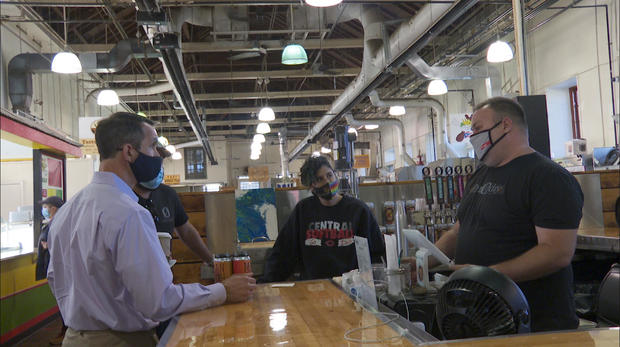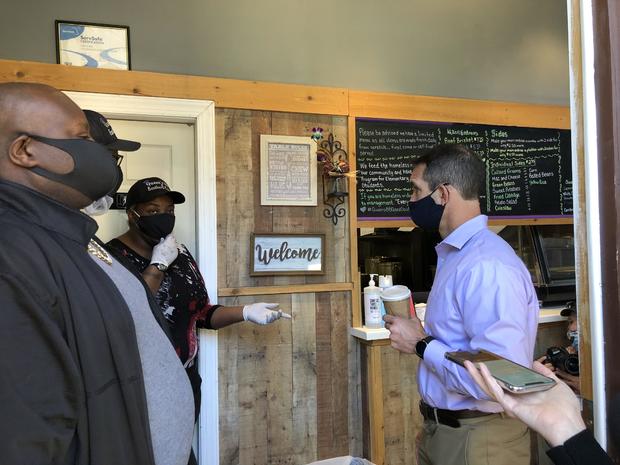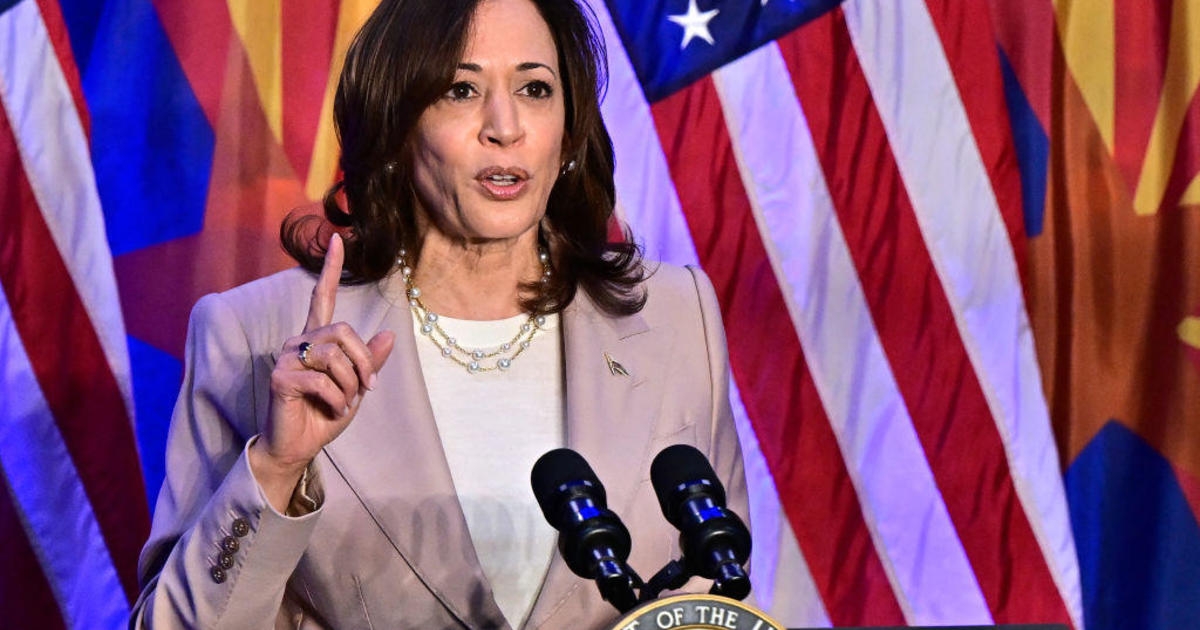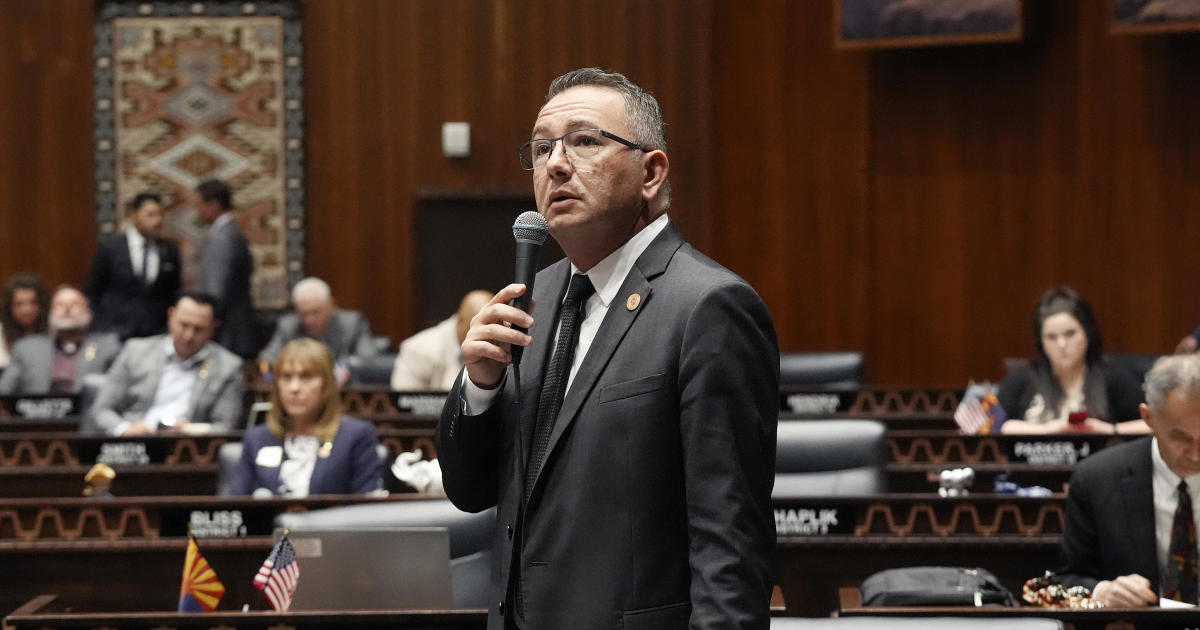Coronavirus remains central to battleground Pennsylvania House races
On a typical fall Saturday with college football underway, the Zeroday brewery's market stand in Harrisburg is typically packed all day, said manager Matt Drayer. But now, with the stools removed due to state health guidelines, the bar was empty except for employees.
Drayer approves of the state's handling of the coronavirus but felt the federal government had failed in its response, leading the pandemic to drag on and continue slowing down business.
"I wish everyone would've worked together a little better at the federal level," he said. "I think it could've worked out faster."
Several of the House races to watch in Pennsylvania are those taking place in areas that were pivotal to President Trump's upset win in 2016. But in 2018, many of those districts were won by Democrats. And after protests and riots against police brutality, an ongoing fight over mail ballots and a Supreme Court vacancy, the main issue at the top of candidates' and constituents' minds is still the coronavirus and its economic blowback.
In particular, the presidential bellwethers for the state are located in the Philadelphia and Pittsburgh suburbs, as well as the state's more Republican "T-area," according to county chairs of both parties. Mr. Trump saw big victories in the central and Northeast part of the state, cancelling any Democratic advantages in the metropolitan suburbs.
The 10th District race just east of the state's "T area," between Democrat Eugene DePasquale and Republican incumbent Scott Perry, may share the most similarities with the Trump-Biden race.
Mr. Trump won this South Central district by 9 points in 2016, though the past few months of polls have shown a consistent single-digit lead for both DePasquale and Biden. The latest CBS poll conducted at the end of September shows Vice President Biden with a 7-point lead statewide.
DePasquale has shared the ballot with Biden and Trump before, winning his election for state auditor in 2012 and his reelection in 2016. He has anchored his campaign on pragmatism, pointing to his experience as state auditor and in the state legislature while critiquing D.C. gridlock on a stimulus package.
"It's going to be very competitive here," DePasquale told CBS News in Harrisburg. "Clearly D.C. failed, Congressman Perry and all of D.C. failed on this pandemic response."
"We know it's going to be close… but we're confident when my style of leadership is put up against Congressman Perry's, we're going to win this election," he added.
Perry, an incumbent since 2013 who hasn't led in a publicly released poll since early August, said he's not putting too much weight on the numbers. He's also not new to tight races -- his 2018 margin of victory was less than three points.
"Look, we've been here before. It's never easy. It's never really comfortable. We're having millions and millions of dollars in ads from Speaker Pelosi and her companions dropped into the district," Perry told CBS News. "The best way we combat that and to be successful is to, again, go meet your voters face-to-face as much as possible. Understand their concerns, live the same concerns that they do, and to have them know that you have their back."
Perry also criticized the state's Democratic governor, Tom Wolf, for his shutdowns and the state's economic woes. His campaign has also gone after DePasquale's role as state auditor, claiming he didn't do enough to investigate the Governor's COVID business waiver program, which granted permission for certain businesses to remain open at the onset of the pandemic.
Local Republicans are bullish about Perry's chances of holding onto his seat, in part due to the substantial ground presence Republicans have in the district and a shrinking gap between the parties in statewide registration numbers. Democrats still hold a 724,000 registration advantage in the state, but Republicans have closed the gap by 200,000 voters since 2016.
When asked about Mr. Trump's path to victory in the state, like the president, Perry pointed to a pre-COVID economy and tied DePasquale, Biden and Pelosi to "leftist" figures like Congresswoman Alexandria Ocasio-Cortez. Acknowledging that Mr. Trump's rhetoric can turn off some voters, he said in the end, voters will have to "juxtapose" Trump's policies with "how the messaging comes out."
"They have to decide, you know, if I don't like how the message is delivered, do I like what the message is? And so you have to make a decision on policy, not on whether you're going to have the President of the United States come to dinner at your home," he told CBS News.
The northeastern Luzerne County, just outside Vice President Joe Biden's hometown of Scranton, saw one of the most dramatic swings in 2016. It went for President Obama by 5 points in 2012, then in 2016 threw its support to Mr. Trump by about 20 points.
Democratic Congressman Matt Cartwright framed 2016 as a "change" election and said "there was no way in God's Green Earth" that Hillary Clinton could be seen as a change candidate.
"She was so identified with Washington politics at that point …Will it be different in 2020? I think so. I just think Biden is a different candidate than Secretary Clinton," he told CBS News, adding Biden has clearer ties to the area, too.
Cartwright has been in Congress since 2012 but saw his seat redistricted in 2018. Mr. Trump won this configuration of the district by almost 10 points in 2016.
His Republican opponent, Jim Bognet, is a former Trump administration official and has aligned himself with Mr. Trump's anti-China rhetoric and support for law enforcement. During the height of the protests, Bognet aired an ad in the Portland media market encouraging its residents to move to Northeastern Pennsylvania.
Jean W. Harris, a political science professor at the University of Scranton, said Mr. Trump's positive COVID-19 diagnosis and the lack of an economic stimulus package doesn't really help other Republicans on the ballot to focus on issues other than COVID-19.
On Tuesday, Mr. Trump tweeted that negotiations over a COVID-19 bill wouldn't happen before the election. He pinned the blame on House Speaker Pelosi, saying she and Democrats were requesting too much money "to bailout poorly run, high crime, Democrat States." He later seemed to walk it back, calling on Congress to pass specific coronavirus relief measures.
Harris said "it has big impacts here if there's not another package" and that while she expects most voters have already made up their mind, it could mobilize more Democrats.
Patrick Purcell of WIlkes-Barre, voted for Mr. Trump in 2016, but said to CBS News the president's handling of the pandemic has pushed him towards Biden.
"I think [Trump] has to help the middle class more," he said. "I think that he has to come out with regulations for COVID across the board."
Larry Palumbo, an unemployed mechanic raised in Hazleton, blamed Washington for not doing enough to help low-income communities, even before the pandemic. But he especially blames congressional Democrats for the lack of action on another stimulus package.
"The people need it, especially people of low income that are suffering. I don't see why -- what's the reasoning behind it? People need help right now," he said. Palumbo didn't vote in 2016 but is leaning towards Mr. Trump this year, saying he believes he's a better leader than Biden.
Freshman Congresswoman Chrissy Houlahan, a Democrat, is part of the Problem Solvers caucus, a group of 50 House members who worked on a bipartisan COVID relief framework. Negotiations have stalled, but she said she'd continue to work with House Republicans on relief.
Houlahan's 6th District seat in the western Philadelphia suburbs includes Chester County, the only Pennsylvania county to flip from Republican to Democrat in 2016. That Democratic shift continued in the 2018 midterms, when she flipped the seat by more than 17 points.
Chester County Democratic party chair Dick Bingham predicted Biden would double Clinton's margin of victory here, in part because of the 23,000 new Democrat registrations and the local party infrastructure "continuing to mature."
Houlahan has a huge cash advantage for her first re-election bid, with close to $2.7 million cash on hand while her Republican opponent John Emmons had less than $200,000 by the end of July.
Houlahan is "cautiously optimistic" about Biden's prospects in her area and the state, pointing to more voter engagement in the area. But she's still haunted by 2016.
"I was sitting with my popcorn and balloons, ready to watch the results of the Clinton-Trump election. And until about 9:30 at night, I thought we had that one," she told CBS News. "So I am going to work until the last hour of the last day to make sure this doesn't have a history repeating itself kind of thing."
Zak Hudak contributed to this report.






